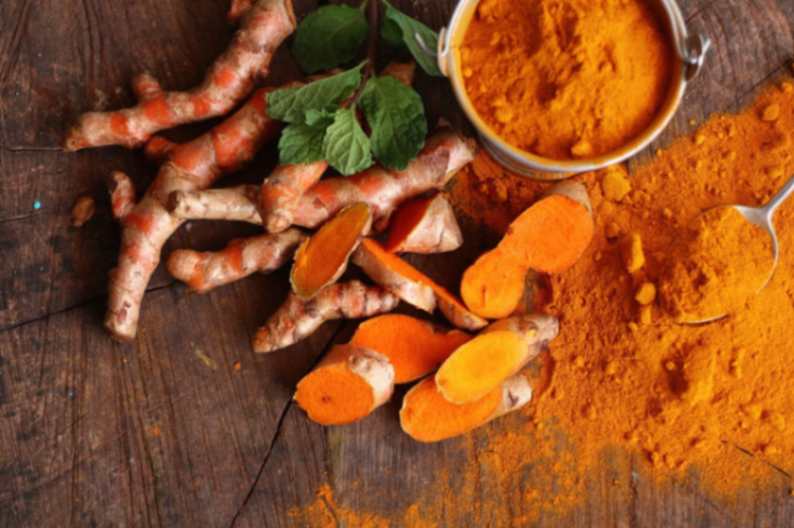There are few activities as satisfying as cooking a fully nutritious meal for yourself that also happens to be entirely delicious. And we’re not talking about simply grilling a hamburger, heating a handful of frozen fries, and dumping a salad from a bag—instead, this is a meal that as you’re eating, you know exactly what nutrients are being delivered because you chopped and prepped every ingredient yourself.
Article at a Glance
Curcumin For Health
- Curcumin is a major compound in the common kitchen spice turmeric
- Turmeric’s medicinal applications date back 4,000 years in India’s Ayurveda medicine
- Many of its health applications are due to curcumin’s antioxidant and anti-inflammatory properties
Curcumin As An Anti-Inflammatory
- While acute/temporary inflammation benefits the body, chronic inflammation harms the body
- Chronic inflammation could trigger numerous negative conditions
- Curcumin’s anti-inflammatory properties are powerful and could block chronic inflammation
Curcumin As An Antioxidant
- Oxidative stress constitutes an imbalance between antioxidants and free radicals
- Free radicals can damage fatty tissue, proteins, and DNA
- Curcumin has been shown to increase antioxidant activity
Curcumin As A Brain Nootropic
- Nootropics cross the blood-brain barrier to deliver cognitive-boosting benefits
- A patented form of curcumin has been shown to slow the development of a protein that could lead to age-related cognitive decline
- Curcumin has also shown promise in addressing depression
Curcumin For The Heart
- Chronic inflammation could cause certain heart conditions
- Curcumin’s anti-inflammatory effects could improve the function of blood vessels
- Curcumin could also help individuals recover after a cardiovascular event
Curcumin For Joints
- Joint discomfort could be caused by oxidative stress
- Curcumin demonstrates a positive effectiveness in osteoarthritis situations
- Curcumin has also shown promise related to rheumatoid arthritis
The components of the foods you eat can often make or break how healthy—or unhealthy—you feel, and this includes the spices and herbs you incorporate into cooking in order to inject flavor and color into the meal.
One of the most commonly used spices in parts of the world is turmeric, a root that belongs to the ginger family and is characterized by bright orange flesh and tough skin. More typically utilized in your kitchen in its ground, packaged form, in culinary terms, turmeric is mildly aromatic, with a pungent flavor that makes it ideal for Indian curries. But the talents of this international spice go well beyond mere flavor, as it possesses elements that could trigger an array of healthy reactions inside of your body.
The Role Of Curcumin In Thousands Of Years Of Health
The medicinal applications of turmeric date back nearly 4,000 years, most notably in what’s known as Ayurveda medicine—an approach to health that’s based on ancient writings relying on natural and holistic pathways to physical and mental health. The world’s oldest system of health, Ayurveda remains one of India’s traditional health care systems and combines diet, exercise, and lifestyle in its regimen.
And turmeric’s role in Ayurveda and the ongoing nutritional approach to healthy living is mainly due to the polyphenol known as curcumin, one of more than 100 compounds that have been isolated in turmeric. Research demonstrates that curcumin could aid in the management of oxidative stress and inflammatory conditions in individuals with certain health concerns, while the compound’s antioxidant and anti-inflammatory properties could provide benefits to otherwise healthy individuals.
Before we go any further, it’s important to note that curcumin offers poor bioavailability, meaning it’s not easily absorbed into your bloodstream. However, you can boost the rate of bioavailability of curcumin by pairing it with piperine, an active component of black pepper that can increase curcumin bioavailability by 2,000 percent. Keep that in mind as we further discuss the various health benefits of curcumin.
Curcumin Is A Natural Anti-Inflammatory
Inflammation is the type of bodily process you hear about, but don’t immediately identify as a positive necessity. In fact, inflammation is incredibly important to your health and wellbeing. When you have a cold, for example, and your nose starts running and coughing increases and you generally feel like sleeping until it goes away—that’s inflammation. Without inflammation, foreign invaders like bacteria or viruses would easily overwhelm your system and quickly transform typical infections into death sentences.
What’s described above is acute, short-term inflammation, a beneficial response from your body outside agitators. This differs entirely from chronic inflammation, which is the scourge of the human body. Rather than your body’s normal response to invaders, chronic inflammation can contribute to a wide range of conditions like heart disease, obesity, various degenerative conditions, cognitive ailments and more.
In fact, scientists posit that this type of inflammation plays a major role in nearly every Western disease under the sun. This means that any nutrients with anti-inflammatory properties could theoretically be a vital cog in preventing these conditions—nutrients like curcumin. Researchers say that as an anti-inflammatory agent, curcumin is so strong that it can match the effectiveness of some clinical drugs, minus the side effects. According to studies, the anti-inflammatory prowess of curcumin seems to come from the compound’s ability to block inflammation from being triggered in your body at the molecular level.
Curcumin As An Antioxidant Against Oxidative Stress
Another force of physiological nature that can be detrimental to your overall health if it goes out of control is oxidative stress, which amounts to an imbalance between the free radicals and antioxidants that roam through your body. Basically, free radicals are molecules that boast an uneven number of electrons, along with oxygen. And it’s this odd number of electrons that push these molecules to unhealthy reactions, or oxidation.
While oxidation is a part of your body’s normal processes, a major molecular imbalance between free radicals and antioxidants can signal damage to your fatty tissue, proteins, and your DNA. For those of us who are considered to be in the throes of advanced age, free radicals naturally accumulate throughout life and are often cited as a risk factor for a number of chronic conditions, such as cardiovascular and neurodegenerative disorders, along with the general ravages of aging like joint discomfort and skin wrinkles.
Curcumin is said to dramatically increase antioxidant activity in your body, doing its part to even out the molecular imbalance that allows free radicals to thrive. The compound’s antioxidant potency neutralizes free radicals, scavenging them before they can cause both chronic and age-related harm to your body. Because of its success in facing down oxidative stress, curcumin foods and supplements are highly recommended in studies that aim to solve free-radical scavenging.
While oxidation is a part of your body’s normal processes, a major molecular imbalance between free radicals and antioxidants can signal damage to your fatty tissue, proteins, and your DNA.
Curcumin Benefits The Brain As A Nootropic
Nootropics are a highly researched class of substances that are used to boost brain abilities, enhancing your cognitive and memory performance by successfully crossing the blood-brain barrier. Decades of research demonstrates that nootropics are indeed a viable agent in increasing overall mental performance, specifically memory, concentration, attention, and even motivation.
A specific type of curcumin, the nootropic Longvida® Curcumin, is a patented form of the compound developed neuroscientists to specifically support brain function. In fact, a series of studies indicate that Longvida® Curcumin, and curcumin in general, could potentially inhibit the proliferation of amyloid beta protein, which plays a role in the development of age-related neurodegenerative conditions.
And in another study, Longvida® Curcumin proved to possess an efficacy in benefiting middle-age people, with curcumin again showing the ability to reduce amyloid beta protein.
But the promise of curcumin isn’t only relegated to age-related brain conditions, as a 2017 review found that curcumin could be a positive option in addressing symptoms of depression. The connection seems to be related to chronic inflammation, which could have a hand in triggering depression—which makes curcumin’s unique anti-inflammatory properties a promising option.
The Heart Health Benefits Of Curcumin
Once again, the antioxidant and anti-inflammatory properties of curcumin makes it a potent option in addressing cardiovascular concerns. As it happens, chronic inflammation in your heart could set off the build-up of fatty, cholesterol-rich plaque in your arteries—and this has the potential to cause catastrophic cardiovascular events.
Research shows that curcumin’s antioxidant and anti-inflammatory effects demonstrate a positive effect on various heart-related ailments, including the aforementioned inflammation. Specifically, studies show that curcumin improves the function of the lining of your blood vessels, regulating blood pressure, blood clotting, and more.
Meanwhile, curcumin has also shown promise in helping people to recover after a cardiovascular event. One study demonstrated that participants who received curcumin after undergoing coronary artery bypass surgery had a 65 percent decreased risk of having a heart attack in the hospital.
Curcumin For Joint Discomfort
Arthritis, which refers to a variety of joint conditions, affects people of all ages and is the leading cause of disability in the country. It’s so prevalent that according to the Centers for Disease Control (CDC), more than 50 million adults deal with some form of arthritis—and that number will only continue to rise as the population ages.
Since curcumin’s antioxidant properties counter the effects of oxidative stress, it makes sense that the compound has shown to be effective in addressing joint discomfort, as oxidative stress is one of the root causes of deteriorating joint health. With osteoarthritis specifically, curcumin has demonstrated a positive effectiveness in several studies.
For example, one randomized study demonstrated that curcumin significantly improved joint discomfort in participants with knee osteoarthritis.
And in another study concerning rheumatoid arthritis, curcumin also showed anti-inflammatory promise in reducing the tenderness and swelling of joints. Then there’s Meriva® Curcumin, another patented form of the compound that studies show help to decrease joint pain. What makes Meriva® Curcumin so popular is it’s higher rate of absorption, which is credited to the preparation’s phytosome matrix.
Curcumin To Spice Up Your Healthy Life
The highly versatile turmeric—especially its active compound curcumin—boasts scientifically proven health benefits that go well beyond culinary applications in your kitchen. So, work this fantastic international ingredient into your everyday diet, while also considering including curcumin supplements into your long-term health regimen.









